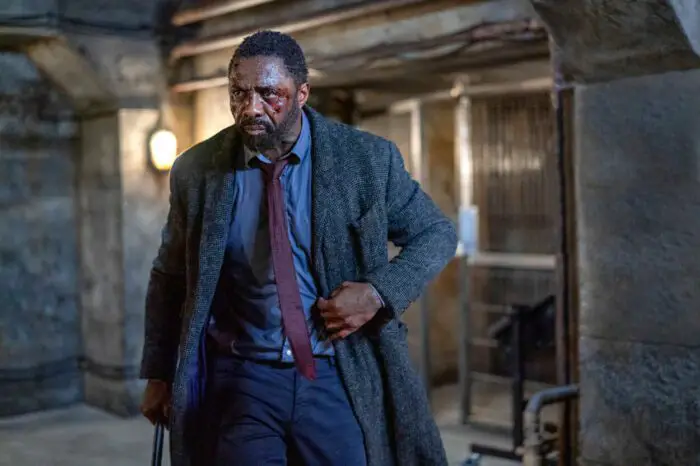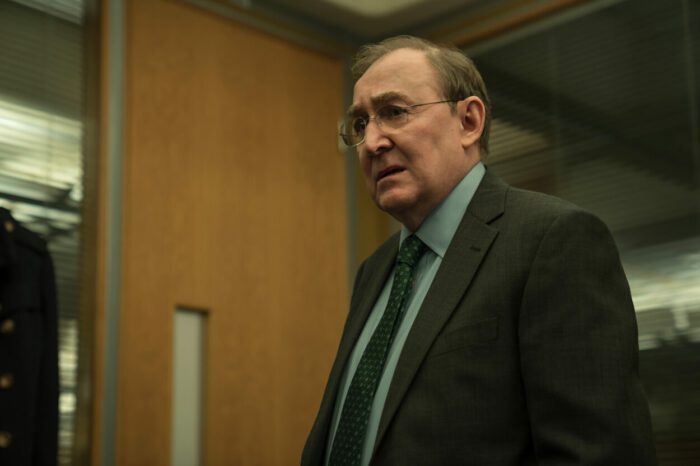The evolution of DCI John Luther from small screen to cinematic hero has felt inevitable for some time, given the gravitas and sheer power of Idris Elba’s movie star presence.
Luther, or Luther: The Fallen Sun as it is otherwise known, begins a transition long planned by writer Neil Cross, who in 2010 made an immediate mark with the TV series Luther, introducing audiences to Elba’s signature role. John Luther had the intellect of Holmes, the handsome brawn of Bond, and the moral fluidity of Richard Stark’s Parker. Across five series, spread over almost a decade, Luther pursued some of the most disturbed and strange criminal psychotics ever witnessed on British television, all while grappling with how to bend and often break the law for what he considered the greater good.
In that sense, Luther was and remains an archetypal hero. At points, he resembles Bruce Wayne’s Batman; haunted by the tragic loss of family, refusing to kill even the deadliest of criminals where possible, towering over an evocative, neo-noir London where he stood guard over the darkest of underbellies, tackling everything from corrupt detectives, master criminal murderers, pure psychopaths seeking to write themselves into the litany of urban myth, and even old-time gangsters. Especially in his obsession with Ruth Wilson’s seductive mastermind Alice Morgan, Luther eternally teetered on the edge of becoming that which he sought.
Cross had big screen intentions for Luther very early on and after a fifth series that, in many respects, served as an ending to many of the ongoing threads woven through twenty episodes on television, he and Elba made clear that a broader canvas was now needed to tell the next chapter of Luther’s story. The series ended with him arrested, in part somewhat unduly, and largely for crimes and misdemeanours that had been catching up with him from the very beginning. Less a cliffhanger and more of a symbolic reckoning, Luther the show concluded with our hero fallen, cast out of the life that defined him, destined for exile.

The task of The Fallen Sun (which for the purposes of this review we will refer to the film as, partly to distinguish from the character), therefore, is to both continue Luther’s journey from that moment and conceptually reintroduce him to a potential new audience meeting the character in a different medium. How Cross does this reminded me of the second X-Files movie, I Want to Believe. That too followed several years after the series concluded, a series ending with our hero—Fox Mulder—tried, convicted and a fugitive (in his case unjustly), and which saw he and fellow FBI agent Dana Scully no longer in the roles they became iconic for, drafted into the Bureau to help them catch and unmask a vicious killer, divorced from the wider mythology around the show.
Cross has cited The X-Files as one of the primary inspirations for Luther (though I have always felt Chris Carter’s linked series Millennium to be the more accurate bedfellow), and one wonders if I Want to Believe was structurally on his mind in writing The Fallen Sun, in how both pictures have to somewhat retcon themselves out of the corner they have necessarily written the characters into. In Luther’s case, Cross establishes that in the final series of the show, our hero was simultaneously looking for a missing young man, Callum Aldrich, while investigating the case that drove him through that fifth run. Given how busy Luther was during that series, this feels unlikely.
Nevertheless, it allows Cross and director Jamie Payne (who also helmed the final episodes of Luther on TV in a solid base of continuity) to connect the film version and television show and begin the work that The Fallen Sun has to do—increase the stakes, increase the scope, and provide Luther with his greatest challenge to date, all while remaining true to the pulp stylistics of the series that spawned it. On that level, The Fallen Sun is a success. Though it works perfectly well as a two-hour extended adventure that could be watched in line with the series, Payne does manage to visually expand Luther’s London and is given the breadth to take Luther, for the first time, abroad, to a Scandinavian wasteland and a literal house of horrors.
What works about The Fallen Sun, first and foremost, is Luther himself. The picture elevates him from gifted TV detective into a genuine cinematic hero, albeit one with a tainted past. Elba steadily depicts this rebirth and transformation from a beginning where a jailed Luther is jagged and disheveled, beaten by a system he often believed to be compromised, all the way through to the heroic detective figure we knew and found charming enough to love, even with his demons. Visually Payne represents this as Luther, despite being beaten, stabbed and hunted by the force he used to represent, reconstitutes the suit he often wore, replete with signature red tie. Come the end, despite everything, he is DCI John Luther again, and even those who doubted him accept that.

Cross only retains from the TV series Luther’s old boss and friend, Martin Schenk (played with deadpan calm by Dermot Crowley), who slots nicely as an ally in a police operation headed by the dogged DCI Odette Raine (Cynthia Erivo)—the new female Luther, basically, sans his lawless defiance—a woman simultaneously working to bring Luther in after he breaks out of prison and stop the villain of the piece who both end up hunting. Erivo’s role is somewhat thankless, as the talented cop who doesn’t see our hero’s brilliance at first, and hers follows a traditional route. Nonetheless, Cross fuses enough character development with plot mechanics to keep Raine & Schenk valuable to a story that remains driven by Luther, desperately trying to be the detective he was at the same time as being a fugitive. It’s very entertaining.
Equally as engaging is the villain of the piece, David Robey (played with ghoulish relish by Andy Serkis), a man who perfectly exists within the pantheon of Luther villainy. He is, in many ways, the ne plus ultra of the sadistic, manipulative murderer within the Luther lexicon, certainly to date. Coiffed, super wealthy, seemingly urbane, psychotically charming in places, he is also an unremitting lunatic. If Luther is Batman, Robey is without doubt his Joker, an agent of pure chaos. He does, ultimately, have a plan, one driven jointly by capitalist gain but also sinister male toxic grievance politics. He sees himself representing a repressed subculture, pinned down by the forces of law represented in icons like Luther, who just want to be free to indulge their darkest impulses. Robey is the monster in the dark.
The Fallen Sun does take time in unfurling this masterplan, admittedly, and how easily it is foiled does suggest Robey is less the dark genius he believes himself to be, but that could well be Cross’ point. It is nonetheless difficult to see him in one sequence knocking seven colours out of Luther. Robey works best as a taunting reflection of the worst male impulses rather than a Krav Maga-sporting physical antagonist. Few really can go toe to toe with the hulking Elba, especially as Luther begins the transformation into a larger than life movie icon. Payne’s film takes more than a little cue at points from the John Wick franchise, from a key sequence of Mission Impossible: Ghost Protocol that it effectively steals, and the final act is straight out of Skyfall.
For some these could be negatives but for me it placed The Fallen Sun within a cinematic pantheon of action thrillers that Luther, as a character, more than deserves to reside within. His first outing on the big screen is a great experience for anyone who loves the television series, and would largely be accessible for anyone approaching him for the first time around. It is dark, though not without humour. It provides arresting and haunting imagery and, especially in the final act, a sense of scope that is truly exciting to see Luther head toward. It proves the malleability of the character and how well he will be able to sustain a franchise that, judging by the final scene, could take him into a thrilling and entirely new paradigm.
With room for growth as a series, Luther: The Fallen Sun is a rewarding, exciting and brutal first foray for John Luther on a big canvas. So, now what?


